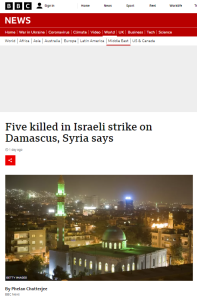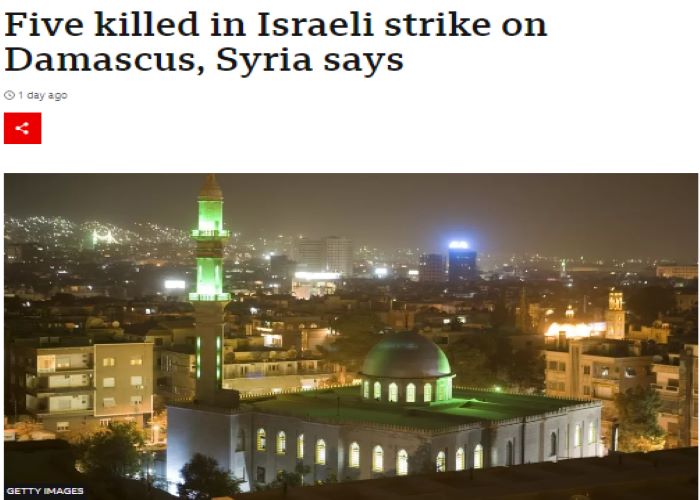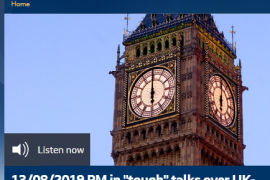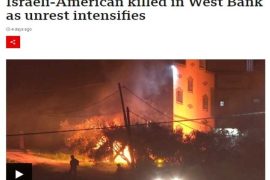On the morning of February 19th the BBC News website published a report by Phelan Chatterjee titled ‘Five killed in Israeli strike on Damascus, Syria says’.
As suggested by that headline, the BBC’s presentation of the story is based primarily on Syrian regime statements, with no attempt made to alert readers to the unreliability of such sources. Thus, readers are told that: [emphasis added]
“Syria’s military says five people have died after what it alleged were Israeli missiles hit the capital Damascus and surrounding areas on Sunday.
Officials said a building was hit in the central Kafr Sousa neighbourhood, killing four civilians and one soldier. […]
The strike – which hit at 00:22 local time (21:22 GMT) – caused damage to several homes in Damascus neighbourhoods and other nearby areas, Syrian officials said.
The country’s defence ministry said the rockets were launched from the Golan Heights, a rocky plateau south-west of Damascus which was annexed by Israel in 1981.”
The only other source quoted in the report is the SOHR: the one-man-show which is not “London-based” as claimed by Chatterjee (but run from Coventry in the UK) and which has been shown in the past to be not always reliable.
“The London-based Syrian Observatory for Human Rights put the death toll at 15 people, including civilians.
“The strike on Sunday is the deadliest Israeli attack in the Syrian capital,” said Rami Abdel Rahman, head of the observatory.”
Clearly none of those uncritically quoted statements and claims had been independently verified by the BBC before publication.
In the five and a half hours or so after its appearance the report underwent some mostly minor amendments, one of which was the addition of the sentence highlighted below:
“Israel frequently attacks targets in Syria linked to Iran and Hezbollah militants but rarely acknowledges its actions. However, attacks on residential areas are rare.”
The addition of that sentence is particularly noteworthy given that just two paragraphs earlier readers are told that:
“The densely populated district [Kafr Sousa] is home to a large, heavily guarded security complex.”
Moreover, two paragraphs after the amended one, readers find the following:
“The Kafr Sousa area is home to senior officials and security agencies, but also civilians living in residential buildings.”
The BBC’s report makes no effort to inform readers of the nature of that “heavily guarded security complex” or those “security agencies” located in a civilian neighbourhood.
Chatterjee had apparently read a Reuters report on the incident before writing his own:
“Israel’s military declined to comment on the strike when approached by Reuters news agency.”
Reuters was however able to provide its readers with more information concerning those “security” sites, as were other media outlets:
“An Israeli rocket strike early on Sunday hit a building in central Damascus, killing five people and damaging several buildings in the densely populated district, witnesses and officials said.
The strike hit near a security complex around which Syria’s ally Iran has installed bases, two intelligence sources said. […]
It was not immediately clear whether the Israeli strike was aimed at a specific individual, but two Western intelligence sources said the target was a logistics centre in the building run by Iran’s Islamic Revolutionary Guard Corps (IRGC).”
The BBC’s article has not been updated to include reports from Reuters and additional sources that some of the damage in the neighbourhood – and possibly one of the casualties, according to Syrian opposition sources – was caused by Syrian anti-aircraft fire.
The BBC’s report concludes:
“Israel has previously acknowledged that it targets the bases of militant groups loyal to Iran.
The two countries are arch-foes and in recent years have been engaged in what has been described as a “shadow war” of unclaimed attacks on each other’s assets, infrastructure and nationals.”
Notably, the story presented by the BBC as an Israeli attack on a residential neighbourhood in which four civilians and one soldier were killed does not make any mention of the presence of the IRGC military installations in that neighbourhood and elsewhere in Syria, despite being tagged ‘Iran’.
This is of course by no means the first case in which BBC reporting on incidents in Syria has been sourced from a regime notorious for its propaganda, despite the corporation’s supposed editorial commitment to accuracy and impartiality.
Related Articles:
UNVERIFIED CLAIMS AND ASSAD PROPAGANDA IN BBC NEWS SYRIA STRIKES REPORT






We all know which side the BBC is on in the current Iran-Israel state of war.